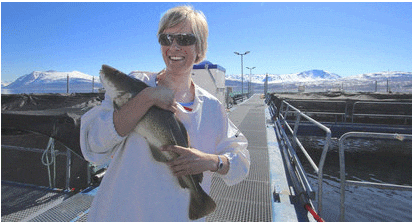Terrestrial livestock are so different that they often have nicknames, but thousands of farmed fish look so similar that many are surprised to learn that biologists claim that fish may have different “personalities” too. Scientists at Nofima have studied the individual behaviour of Atlantic cod in order to examine whether we can breed a fish more adapted for a life in aquaculture.

Nofima runs the National Cod Breeding Programme on the island of Kvaløya outside Tromsø. The scientists here have been working for 11 years to breed Atlantic cod that will form the basis of the farmed cod of the future.
Sometimes understanding what happens in a large group of farmed fish is only possible by studying individual fish. How the fish react to stressful or life-threatening situations provides an indication of how robust or fearless they are to tackle life as a farmed fish.
A typical fear response is that the fish stops, but in all likelihood it is trying to determine how dangerous the situation is.
During a project called MARWEL, the Nofima scientists have studied the extent of such behavioural difference between cod families. The scientists measured the fear response of individual fish in 15 different cod families, and used this to calculate the hereditability of the behaviour of the fish.
“The trial demonstrated a large variation in the response of individual fish and clear differences between the families. All the cod reduced their swimming speed and moved towards the edge of the tanks when they sensed fear. However, some were not particularly scared and soon returned to their normal behaviour. But for others, the reaction was both stronger and lasted longer. These are fundamental characteristics that in all likelihood will follow the cod throughout their whole life. Genetics accounted for 20-30 percent of the variations in the swimming activity and how long the fish stayed in the middle of the tank or out along the edges,” says Director of Research Ingrid Olesen and Senior Scientist Børge Damsgård at Nofima.
The scientists use advanced video technology to study how individual fish react. Nofima has for several years developed methods to measure what influences behaviour in fish. Typical examples include swimming activity, feeding behaviour, fearlessness or response to stressful situations.
“This trial showed that breeding can be an important tool for developing a fish with good and desired behaviour, but we still have insufficient knowledge about what influences these individual differences and which characteristics we can breed for,” say the two scientists.
July 2013




